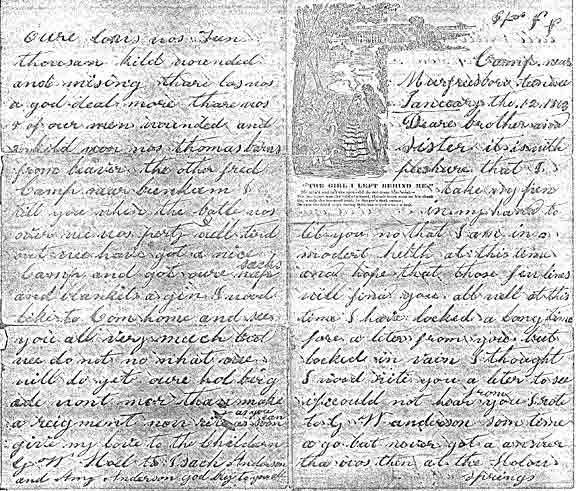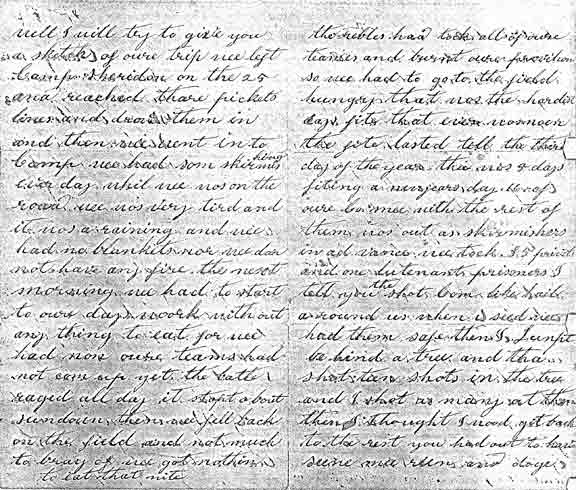George W. Hoel, Company C
Letter: Near Murfreesboro, January 12, 1863
This 1863 letter of George Hoel is to his sister Amy and her husband Isaac Anderson. It was written shortly after the Battle of Stones River, which was fought on December 31, 1862 and the first days of 1863. The letter is first presented with changes in punctuation and spelling, for ease of reading, and then, with copies of the letter itself, and exact transcription of it.
| |
[Page 1]. Camp near Murfreesboro, Tennessee, January the 12th, 1863
Dear brother and sister, it is with pleasure that I take my pen in my hand to tell you that I am in a modest health at this time and hope that these few lines will find you all well at this time. I have looked a long time for a letter from you but looked in vain. I thought I would write you a letter to see if I could not hear from you. I wrote to G. W. Anderson some time ago but never got an answer. They was then at Holly Springs.
[Page 2]. Well, I will try to give you a sketch of our trip. We left Camp Sheridan on the 25th and reached their picket lines and drove them in and then we went into camp. We had some skirmishing every day while we was on the road. We was very tired and it was a-raining and we had no blankets, nor we dare not have any fire. The next day we had to start to our day work without any thing to eat for we had none. Our teams had not come up yet.
The battle raged all day. It stopped about sundown, then we fell back and, not much to brag of, we got nothing to eat that night. [Page 3]. The rebels had took all our teams and burned our provisions so we had to go to the field hungry. That was the hardest day's fight that ever [?]. The fight lasted until the third day of the year. This was 5 days of fighting. On new year's day 16 of our company, me along with the rest of them, was out as skirmishers in advance. We took 85 privates and one lieutenant prisoners. I tell you the shots come like hail around us. When I saw that trees had them safe, then I jumped behind a tree and they shot ten shots in the tree and I shot as many at them. Then I thought I would get back to the rest. You had ought to have seen me run and dodge.
[Page 4]. Our loss was ten thousand killed, wounded and missing. Their loss was a good deal more. There was 3 of our men wounded and 2 killed. One was Thomas Barnes from Beaver, the other Fred Camp near Bunkum. I tell you when the battle was over we was pretty well tired.
We have got a nice camp and got our knapsacks and blankets again. I would like to come home and see you all very much, but we do not know what what we will do yet. Our whole brigade won't more than make a regiment now.
Write as soon as you can. Give my love to the children. G. W. Hoel to Isack Anderson and Amy Anderson. Good-bye to you all. |
|
 |
[Page 1]. Camp near
Murfreesboro Tennessee
January the 12, 1863
Dear brother and
sister it is with
pleshure that I
take my pen
in my hand to
let you no that I am in
modest helth at this time
and hope that those few lines
will find you all well at this
time I have locked a long time
locked in vain I thought
I wood rites you a letter to see
if i could not hear from you I rote
to G. W. Anderson some time
a go but never got a answer
tha was then at the Holm...
springs
[Page 4]. oure loss was ten
thousand kild wounded
and mising thare loss was
a good deal more thare was
3 of our men wounded and
2 kiled won was Thomas Barns
from beaver the other fred
camp near bunkum I
till you when the batle was
over we was pretty well tired
and we have got a nice
camp and got our nap sacks
and blankets a gin I would
likes to com home and see
you all very much
we do not no what we
will do yet our hol berg
ade wont mor than make
a reigment now write as soon as you
give my love to the children
G W Hoel to Isack Anderson
and Amy Anderson god by to you all
|
 |
[Page 2]. Well I will try to give you
a sketch of oure trip we left
Camp Sheridan on the 25
and reached thare pickets
lines and drove them in
and then we went in to
camp we had som skirmeshing
every day whil we was on the
road we was very tird and
it was a raining and we
had no blankets nor we dar
not have any fire the next
morning we had to start
to oure days woork with out
anything to eat for we
had non oure teams had
not com up yet the balter
raged all day it stopped a bout
sundown then we fell back
on the field and not much
to brag of we got nothing
to eat that night
[Page 3]. The rebels had took all of oure
teames and burnt our provition
so we had to go to the field
hungry that was the hardest
days fite that ever [?]
the fite lasted till the third
day of the year this was 5 days
fiting on newyears day 16 of
our compmee with the rest of
them out as skirmishers
in advance we took 85 privates
and one lutenant prisoners I
tell you the shots com like hail
a round us when I sied trees
had them safe then I jumped
be hind a tree and tha
shot teen shots in the tree
and I shot as many at them
then I thought I wood git back
to the rest, you had out to have
seene me run and doge
|
Sources and Notes:
Letter scans and biographical information, courtesy of Peter and Margaret (Anderson) Knoess. Margaret is from one of the descendant Hoel lines, and she transcribed the letter.
The episode that Hoel recounts regarding the capture of 80 plus Confederate soldiers at Stones River is the same referred to in the quoted biographical sketch of Albert Eads, lieutenant of Hoel's Company C.
Both Hoel, writing ten days after the episode, and Eads, remembering it decades later, set the number of Company C men at sixteen. It was not the kind of thing one would forget.
Thomas Barnes and Fred Camp both enlisted at Middleport in Iroquois County, as did Hoel. They were from the towns Hoel named, Beaver and Bunkum. Thomas Barnes was killed in the fighting at Stones River/Murfreesboro. Hoel writes only of casualties in his company, Company C.
The G. W. Anderson to whom Hoel refers was his nephew, the son of Isaac and Amy Anderson. G. W. Anderson was a member of the Seventy-Sixth Illinois Infantry, which was active around Holly Springs, Mississippi at the end of 1862, the period of time during which Van Dorn's cavalry captured Grant's trains.

